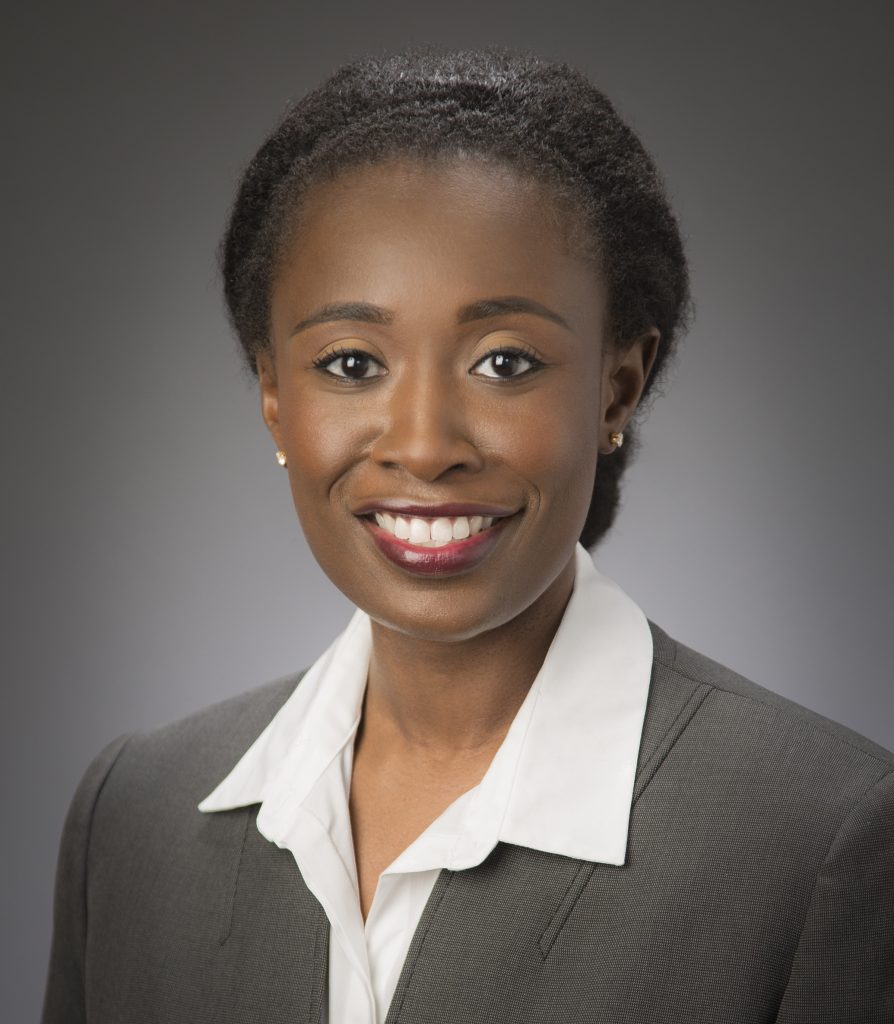
Sometimes people joke that “it’s not rocket science” when referring to a non-technical matter. For one of mechanical engineering’s junior faculty members, her summer research experience with the U.S. Air Force Research Lab was in fact rocket science.
Sarah Bentil, William March Scholar in Mechanical Engineering and assistant professor of mechanical engineering (ME), spent 12 weeks over the summer participating in the U.S. Air Force Research Lab (AFRL) Summer Faculty Fellowship Program (SFFP). (Meng Lu, associate professor with appointments in ME and electrical and computer engineering at Iowa State University was also part of the 2020 SFFP cohort.) Due to the pandemic, Bentil had to conduct her work remotely from Ames instead of at Edwards Air Force Base in California.
Bentil’s summer research was overseen by Timothy C. Miller, senior materials research engineer with AFRL’s Aerospace Systems Directorate. Miller sought to work with someone who could perform experiments that would apply high-speed loads to solid rocket propellants, and Bentil saw an opportunity to assist in this work using her oxyacetylene shock tube to apply a mechanical load on the surface of the solid rocket propellants. Solid rocket propellants are used as fuel in military applications to generate thrust for tactical or strategic rockets and missiles.
“My objective of the experiments was to understand how the solid rocket propellants responded to tensile loads at speeds that are at least on the order of what the propellants will encounter during the ignition and firing process,” said Bentil. “That’s because those loading speeds are when damage to the solid rocket propellant occurs, which manifests as cracks in the material that will negatively impact the ballistic performance.”
By understanding the conditions that will create these cracks, Bentil said the results of her experiments would help AFRL in optimizing the ingredients in the solid rocket propellant to eliminate crack formation. Additionally, these findings would also help AFRL in designing health-monitoring sensors that can predict the behavior of the solid rocket propellant given the percentage of damage.
Bentil creatively adapted her project to the constraints of the pandemic. She conducted most of the research in her The Bentil Group lab on the Iowa State University campus. She did not have the opportunity to participate in the process of making solid rocket propellants and instead relied on Miller, her advisor with AFRL, to ship them to her from California. California’s stay-at-home order prevented Bentil from working with a wide array of solid rocket propellant samples since members of Miller’s team were not permitted in the lab to fabricate additional samples. However, despite these adjustments, Bentil was still able to make the best of the experience.
“Working remotely did allow me to begin developing computational models that would be validated using the results from the shock tube experiments,” said Bentil, adding that computational models would be used in improving damage predictions in the solid rocket propellant.
“I wanted to pursue this computational aspect in the future. However, working remotely and not being able to perform the other experiments using AFRL’s equipment, allowed me to start developing the computational aspect of the project over the summer,” she said.
Bentil utilized various ME concepts and methods throughout her summer research. She and her team utilized Newton’s laws of motion, work-energy principles and vibrations, as taught in ME 345: Engineering Dynamics, as well as data acquisition systems, analysis of data and propagation of measurement uncertainty taught in ME 370: Engineering Measurements. The researchers also utilized stress-strain relationships, elements of material behavior, continuum mechanics and finite element analysis.
The research that Bentil conducted over the summer was mostly new to her as much of her past work has focused on soft tissue (e.g. brain). However, she said she sees similarities between the brain tissue and solid rocket propellants in the sense that both materials are considered “viscoelastic.”
“Viscoelastic means that the material is not a solid and it’s not a liquid. Rather, the viscoelastic material is somewhere between a solid and a liquid. Even though the brain and solid rocket propellant are both viscoelastic, working with the propellant was a lot easier, and not as messy as the brain,” Bentil said.
Going forward, Bentil said she would like to conduct more experiments that will facilitate the prediction of damage in other viscoelastic materials due to loads that are applied at high rates. Aside from some of the direct research knowledge she gained through her participation in the SFFP, Bentil said one of her biggest takeaways from this experience is the potential for future collaborations with AFRL.
“I look forward to future collaborations with AFRL, where Iowa State University students from my lab can also participate in the experiments and computational modeling needed to predict damage in solid rocket propellants and other viscoelastic materials,” Bentil said.
Special thanks to the U.S. Air Force Research Lab Summer Faculty Fellowship Program and Dr. Timothy C. Miller